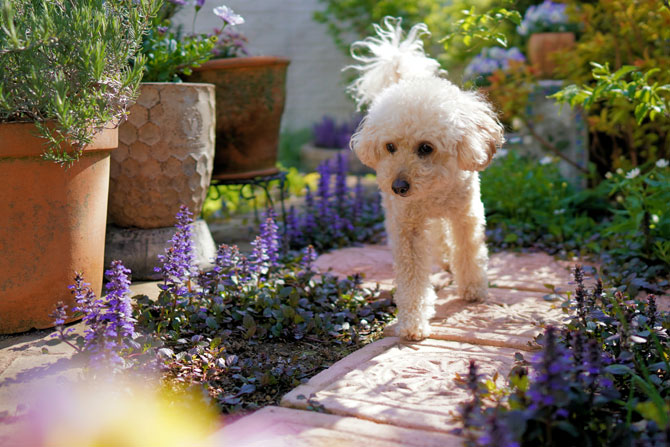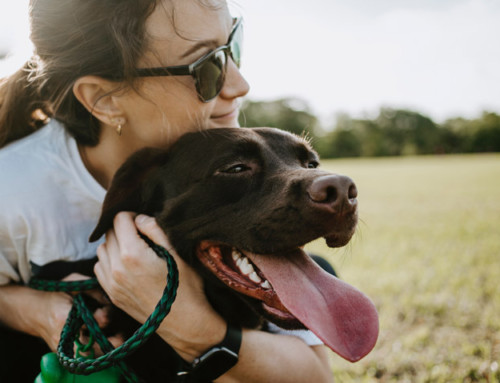Could your garden be a danger zone for your beloved kitty or barking buddy? The answer is yes; as there are lots of pet dangers lurking in the least expected places.
While you might like pretty blooms or your overgrown ‘oasis’, some seemingly harmless things can be deadly for pets. Indeed, inquisitive puppies and curious kitties love nothing more than romping around in the garden and hiding in flower beds. However, are you aware of the potential pet dangers lurking in your backyard?
When you’re looking to pet-proof your garden it’s important to take note of all the things curious little pets might find. Garden plants and bugs are one of the biggest threats to household pets. Meanwhile, tools, chemicals, leftover building materials, and even garden décor can be just as dangerous too.
Plants to watch out for in your garden
Many different types of indoor and outdoor plants can cause serious harm to your pet. Often it’s the more beautiful and useful plants that pose the biggest risks. So, be aware of what’s hiding in your garden. After all, poisonous plants can cause kidney failure, intestinal and stomach issues, paralysis and, in the worst cases, they can even cause death.
It is recommended that puppies and kittens aged under 18 months be very closely monitored while roaming in the garden. Flowerbeds, vegetable patches and planted areas should be fenced off.
Common poisonous plants in the garden include:
- Bulbs— onion and all the spring favourites e.g. daffodils, tulips and snowdrops
- Castor oil plants
- Iris, Jasmine and Lilac varieties— the seed pods and flowers can be very nasty to pets if ingested
- Liliums (Lilies)— all parts of the plant are particularly deadly to kittens and cats
- Brunfelsia— especially dangerous to puppies if any part of the plants are eaten, including the fruit which grows after flowering
- Wandering Jew— an insatiable weed that grows in darker, moist places and is very tricky to remove
- Wildflowers and wild mushrooms
TIP: While it’s not a plant as such, the Macadamia nut can be lethal for dogs. The toxic principle is unknown but the signs of poisoning include depression, hyperthermia, weakness, muscular stiffness, increased heart rate, tremors and vomiting. So keep Macadamia nuts out of reach of your canine chum.
Insects can be harmful too
When it comes to pet dangers, don’t forget the creepy crawlies that come into the garden. Certainly, insects can be pests, particularly when they make their way inside! But remember, many of the bugs attracted to your backyard can be very dangerous for your pet.
Regularly check your pet’s fur, mouth and sensitive feet for any nasties they may have picked up outside including:
Fleas— they hide in cool shaded areas until a new ‘host’ like your puppy or kitten walks past and jumps on, quickly becoming an itchy menace.
Ticks— they also like to hide out in cool, wooded areas until they can latch onto your pet. They feed off the host’s blood, and can transmit a variety of blood diseases and even attach to humans.
Stinging bugs such as bees, wasps or ants— just like humans, your pet’s skin is vulnerable to the pain, swelling and itching that comes from bites or stings. Keep curious noses away from nests and monitor your pet’s behaviour.
Caterpillars, moths and butterflies— their ‘slime’ and the casings of their cacoons, as well as their wings when they have developed, can contain harmful toxins.
Common symptoms of poisoning include vomiting, diarrhoea, hyper-salivation, lethargy and abdominal discomfort. If you suspect your pet has been affected by a poison or insect bite, take them to a vet for attention immediately.
How safe is your garden?
Everyday garden fertilisers and insecticides contain a cocktail of ingredients that can be deadly for dogs and cats. They can come in liquid, granular and solid forms and are made up of different amounts of nitrogen, phosphorus and potassium— all ingredients that can cause nasty gastrointestinal irritations in pets.
Less common fertilisers, such as blood meal and meat meal (fine powders made of blood and meat products with a high protein content), can be attractive to dogs and some cats. Be sure to properly store these items away from the reach of super-sensitive nostrils.
Furthermore, rat and mouse poisons are one of the most common causes of pet poisoning and injury. The poisons contain anticoagulants, which stop the clotting of the blood. The RSPCA suggests trying more humane ways of taking care of infestations, such as live traps and snap traps.
Concerned about a possible pet poison? Get in touch with the Australian Animal Poison Helpline. Visit: https://animalpoisons.com.au or call 1300 TOX PET.
Got a spare few minutes? Read more about common pet poisons and toxins.
Image source: Unsplash.com







Leave A Comment